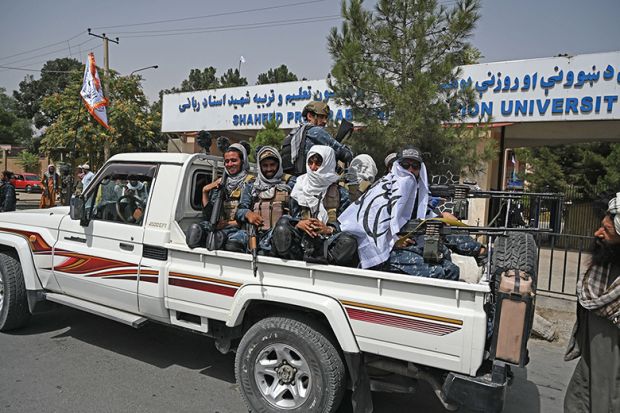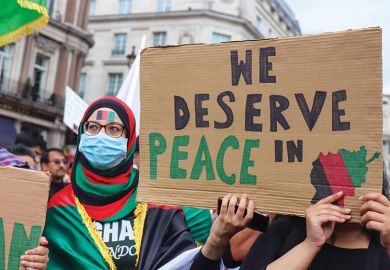More than a month after the US withdrawal from Afghanistan and the Taliban takeover that threw the country into chaos, students’ lives are in upheaval.
Some have been able to flee the country, but for many the future is bleak. Many universities are yet to resume classes.
“There is a firm belief in all of us that nothing is going to be like the past – our freedom, our rights, our lives,” said Nooda Nikan, a law and political science student at Herat University, in western Afghanistan.
Ms Nikan said she was one of few students to risk venturing on to her campus. When she did so in early October, she saw few people and no other women. Still unable to take classes at her university, she has resorted to free online courses.
“By these classes I make myself busy and don’t overthink the situation,” she said.
The situation has been slightly better at private universities, some of which continue to hold classes online, according to students.
But even for those whose courses continue, turnout and engagement are low, with online classes running at a fraction of their capacity, students said. They blamed poor internet, especially in Afghanistan’s provinces, and the costs of paying bills when many had lost jobs.
“We are afraid that soon there will be no students left who will be willing to study,” said a medical student who was still attending in-person classes at Malalay University, a private institution in Kandahar. Like many of the nine students and recent graduates Times Higher Education spoke to, he asked to remain anonymous due to safety concerns.
All the students said they had difficulty concentrating on their studies. Several had lost part-time jobs and were living off dwindling savings. Some who were in the final months of their course wondered if they would receive a degree.
“I’m forced to take classes to graduate – but what our future holds, we have no idea,” said a student at the American University of Afghanistan in Kabul, who was sharing a single-room flat with a handful of classmates, keeping a low profile out of fear of being targeted by the Taliban.
Another AUAF student said his family had been forced to leave their home, concerned the Taliban might find them.
“We’re living temporarily in our own country as displaced people although we’re in [the] same city as before,” he said.
Although he was more confident about getting his degree, the student said he could not bring himself to return to his university. According to media reports and first-hand accounts, AUAF has been taken over by the Taliban.
The student said the campus was now awash with Taliban flags. “That’s not the sight I want to see of my campus, so I never went there…the spirit of the campus is not there.”
Some AUAF students said they felt “let down” by the university’s efforts to evacuate them. But AUAF president Ian Bickford said that the institution had “carefully considered the viability” of all options in attempting to evacuate students.
“Hundreds of members of our community have safely made it out of Afghanistan. Our efforts continue to relocate hundreds more to sites where they may learn, work, and live without fear,” he said.
Many students continue to hope for opportunities abroad, although prospects look grim.
“We are in limbo now, especially girls who can’t have foreign school opportunities,” said Maryam Jami, a 2019 alumna of the Herat University School of Law and a semi-finalist to the prestigious US-based Fulbright programme, who is among those waiting to hear back about their applications.
She said that she and her peers worry that institutions offering foreign scholarships – even those that consider Afghan students eligible to apply – will toss their applications out of the pile because their nationality has made getting a visa next to impossible.
Around 80 alumni of the UK’s Chevening scholarship scheme remain stranded in Afghanistan or a third country, according to a 5 October letter by MPs urging prime minister Boris Johnson to intervene.
But for most students – even those with fluent English and the means to escape the country – hopes of leaving remain elusive. For now, they said they would continue to join classes, to look for work in their own country.
“I’m living in a basement with relatives. I sit in the yard on the dusty carpet and join my classes, sometimes even tears come from my eyes…but still we are having hope that one day something will happen, that we will be evacuated,” said one AUAF student.
“Or maybe someday, this government will accept us.”
POSTSCRIPT:
Print headline: Afghan students in limbo one month after Kabul fall
Register to continue
Why register?
- Registration is free and only takes a moment
- Once registered, you can read 3 articles a month
- Sign up for our newsletter
Subscribe
Or subscribe for unlimited access to:
- Unlimited access to news, views, insights & reviews
- Digital editions
- Digital access to THE’s university and college rankings analysis
Already registered or a current subscriber? Login








